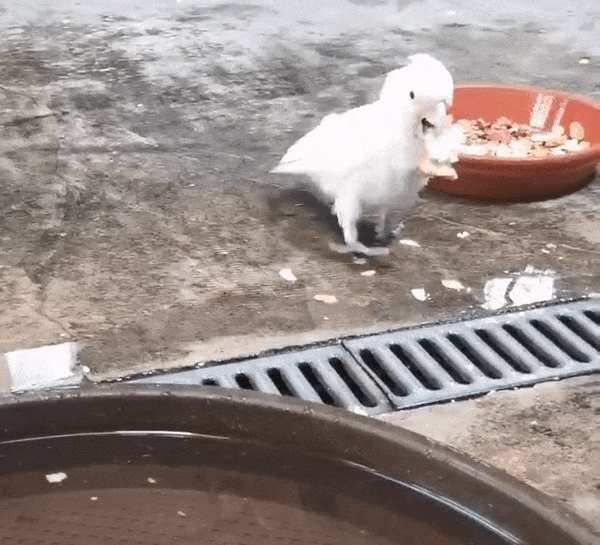Cognition
A.I. Learns Words From a Human Baby's Perspective, Using Headcam Footage
With only limited training, the model could correctly identify certain objects, suggesting some elements of learning language are not innate to humans
These Parrots Won't Stop Swearing. Will They Learn to Behave—or Corrupt the Entire Flock?
A British zoo hopes the good manners of a larger group will rub off on the eight misbehaving birds
Sniffing Women's Tears May Reduce Aggression in Men, Study Finds
The findings, which may extend to all humans, suggest emotional tears might serve an evolutionary purpose
Watch Cockatoos Dip Their Food in Water to Make It Soggy
A new study marks the first time that dunking behavior has been documented in parrots
These Brainy Falcons Are Smarter Than You Might Think
Striated caracaras solved up to eight puzzle box problems in a new study, suggesting they are cognitively complex, like crows and parrots
While Some Chimps Go Low, Others Go High to Avoid a Dangerous Fight
Primate groups climb to elevation to scout out rivals and steer clear of clashes
Roosters May Recognize Their Reflections in Mirrors, Study Suggests
The findings demonstrate self-recognition could be more common among animals than previously thought
These Birds Will Switch Companions to Earn Food but Stick With Family, Study Suggests
Jackdaws, cognitively complex relatives of crows, have intricate social dynamics and mate for life
Brainless Jellyfish Are Capable of Learning, Study Suggests
Scientists provide evidence that tiny Caribbean box jellyfish—which lack a central nervous system—can learn to navigate through mangrove roots
This Pioneering Black Zoologist's Insights Were a Century Ahead of Their Time
Charles Henry Turner conducted trailblazing research on the cognitive traits of bees, spiders and more
Nile Crocodiles Recognize and React to the Sound of Crying Babies
The reptiles may be aware that primate infants are in trouble—and an easy meal
Crows and Magpies Snatch Anti-Bird Spikes to Build Their Nests
Birds in Europe are prying up the metal barbs, meant to repel them from roosting on buildings, and using the devices as nesting material
We Can Hear Silence Like a Sound, Scientists Say
In a study, participants were tricked by "silence illusions" in the same way that illusions with sound fool the brain
FDA Fully Approves First Drug Meant to Slow Alzheimer's Disease
The drug showed promise in an 18-month clinical trial, but some experts have expressed concerns about its safety and cost
Archaeologists Discover the Oldest Known Blueprints
The Stone Age engravings are to-scale depictions of desert kites, massive stone structures used by hunters to capture animals
Great Apes Love to Spin Around—Here's Why
A recent study suggests that apes, like humans, seek out altered mental states
Like Humans and Chimps, Cockatoos Can Use a Set of Tools to Get a Meal
In lab experiments, the brainy birds carried a stick and scooped with them to get at cashews kept in a box
Scientists Suggest a New Layer to Crows’ Cognitive Complexity
The birds may be able to grasp a pattern-forming concept once thought to be unique to humans
Scientists Recreate Cleopatra's Favorite Perfume
Reconstructing the scentscapes of bygone civilizations is anything but simple
Chimpanzees Appear to Use Insects to Treat Their Wounds
In a first, chimps in Gabon were seen applying insects to sores on themselves—and others, a possible show of empathy
Page 2 of 3
:focal(1060x717:1061x718)/https://tf-cmsv2-smithsonianmag-media.s3.amazonaws.com/filer_public/0f/c4/0fc474d4-8a16-4d8e-9ac4-249e1742adf0/gettyimages-75939376.jpg)
:focal(1023x682:1024x683)/https://tf-cmsv2-smithsonianmag-media.s3.amazonaws.com/filer_public/f9/fe/f9fe6b38-2c96-47c9-b04e-90e64289d545/50169287831_0e5d30481d_k.jpg)
:focal(1061x707:1062x708)/https://tf-cmsv2-smithsonianmag-media.s3.amazonaws.com/filer_public/cf/2f/cf2f815d-db5b-4d96-a6af-8e5e5e329700/gettyimages-146601656.jpg)

:focal(1044x566:1045x567)/https://tf-cmsv2-smithsonianmag-media.s3.amazonaws.com/filer_public/d2/d5/d2d57069-2876-4aa2-b895-cd348c2de635/50788460676_17d17ebed1_k.jpg)
:focal(800x602:801x603)/https://tf-cmsv2-smithsonianmag-media.s3.amazonaws.com/filer_public/88/dc/88dcd051-f42b-40b8-8c75-54d9163a3c4e/listening-to-other-chimps-croman-wittig-tcp_web.jpg)
:focal(2953x2250:2954x2251)/https://tf-cmsv2-smithsonianmag-media.s3.amazonaws.com/filer_public/29/ca/29ca4777-fca0-4f77-adb6-1429f9ce037b/gettyimages-1228429912.jpg)
:focal(1061x707:1062x708)/https://tf-cmsv2-smithsonianmag-media.s3.amazonaws.com/filer_public/85/6d/856d4d20-9c97-4dd5-a39d-26bd077c85c0/gettyimages-821279084.jpg)
:focal(1936x1457:1937x1458)/https://tf-cmsv2-smithsonianmag-media.s3.amazonaws.com/filer_public/71/f7/71f7d250-18a1-4c4e-b8b4-9c841731d7c6/a_caribbean_box_jellyfish_credit_jan_bielecki.jpeg)
:focal(800x602:801x603)/https://tf-cmsv2-smithsonianmag-media.s3.amazonaws.com/filer_public/a6/59/a65961c0-7c9a-40d8-a50c-69151022a219/turner3-3200x1200_web.jpg)
:focal(800x602:801x603)/https://tf-cmsv2-smithsonianmag-media.s3.amazonaws.com/filer_public/4f/86/4f866d90-2af3-47b7-9009-90627a799854/gettyimages-53044181_web.jpg)
:focal(700x527:701x528)/https://tf-cmsv2-smithsonianmag-media.s3.amazonaws.com/filer_public/03/3a/033ac987-6b93-4c87-b90e-f8a53cb8f327/web_nest_antibird_spikes.jpg)
:focal(1208x621:1209x622)/https://tf-cmsv2-smithsonianmag-media.s3.amazonaws.com/filer_public/cf/cc/cfccbe87-b487-458f-bcac-7d40745310aa/gettyimages-1404481260.jpg)
:focal(2144x1429:2145x1430)/https://tf-cmsv2-smithsonianmag-media.s3.amazonaws.com/filer_public/0b/74/0b74e984-bf0a-4530-abbc-2827a47e96aa/gettyimages-90998188.jpg)
:focal(350x237:351x238)/https://tf-cmsv2-smithsonianmag-media.s3.amazonaws.com/filer_public/28/71/28710ef0-1c27-4866-974b-c497fbe1cde3/low-res_434jpg.jpg)
:focal(1500x1000:1501x1001)/https://tf-cmsv2-smithsonianmag-media.s3.amazonaws.com/filer_public/0e/69/0e690db9-8e69-41c7-990a-be0d61e09fc1/gettyimages-510754662.jpg)
:focal(800x602:801x603)/https://tf-cmsv2-smithsonianmag-media.s3.amazonaws.com/filer_public/56/8a/568a1dd9-efff-423f-b784-6fcf2ff72767/goffin_lab__070_web.jpg)
:focal(1061x707:1062x708)/https://tf-cmsv2-smithsonianmag-media.s3.amazonaws.com/filer_public/65/cc/65ccae7d-b858-4f9e-9189-1bd597e8cf1a/gettyimages-1319047767.jpg)
:focal(3034x1705:3035x1706)/https://tf-cmsv2-smithsonianmag-media.s3.amazonaws.com/filer_public/ec/16/ec1671ec-f23b-434b-a486-68b4721f90f6/gettyimages-1240562858.jpg)
:focal(2128x1419:2129x1420)/https://tf-cmsv2-smithsonianmag-media.s3.amazonaws.com/filer_public/e4/62/e4620082-2b98-402d-ba47-fb9b61eba8df/gettyimages-625850102.jpg)